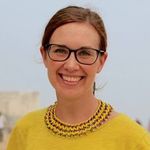Folded Speech: An Ethics of Comings-and-Goings in an Accra Zongo
PI: Emily Williamson, PhD Candidate, Department of Anthropology, Graduate School of Arts & Sciences
Co-PI: Joanna Davidson, Associate Professor, Department of Anthropology, College of Arts & Sciences; Associate Director, Kilachand Honors College

“It is not impossible for a lizard to ride on a housefly!,” artist Nicolas Wayo remarked, directing Williamson’s attention to his wall painting at Kwame Nkrumah Park in Accra, Ghana. Indeed, an intricately painted lizard in a black and yellow-striped jersey mounted on a fly stared skeptically back at her through aviator goggles. The two companions looked poised, ready for take-off. Five minutes later, they arrived back at Nicolas’s compound in Nima, a zongo (Hausa settlement), where he elaborated on his cryptic statement at the Park. “In every house you find a housefly and a lizard,” Nicholas explained. “In my painting, the lizard gives the fly confidence. At the same time, the fly helps the lizard see something new. When they come together, the impossible becomes possible.”
Williamson’s project is not directly about the lizard and housefly, but it is about how very different, even contradictory, things exist side-by-side and, in their interaction, have the capacity to fashion something new and productive. During her long-term ethnographic fieldwork in zongos (also termed “stranger settlements”) stretching across West Africa, she observed how comings-and-goings (zirga-zirga) texture everyday life, weaving together diverse histories, beliefs, objects, geographies, and spirits in tension with one another into concentrated spaces. How, then, does one make sense of the contradictory nature of a lived reality shaped by comings-and-goings? In a place where everything and everyone is somehow strange to one another, what kinds of relationships and possibilities emerge? What might life-ways steeped in multiplicity teach us about an ethics of living with others that relies less on abstract principles than on pivoting to gain another viewpoint?
To answer these questions, Williamson draws upon eighteen months of fieldwork in Nima, the most diverse zongo, where residents regularly voice moral injunctions called “folded speech” that instruct them on how to try on multiple perspectives—an activity she terms “an ethics of comings-and-goings.” To understand how folded speech works, she participated in everyday activities and conversation, conducted interviews, and collected diverse materials, such as folktales, social media, wall art, songs, and Islamic sermons. She suggests that folded speech not only helps individuals adapt to their rapidly changing environment, but also has the capacity to—like a lizard riding on a housefly—transform how they perceive and participate in the world.
See more of our 2021 Early Stage Urban Research Award recipients